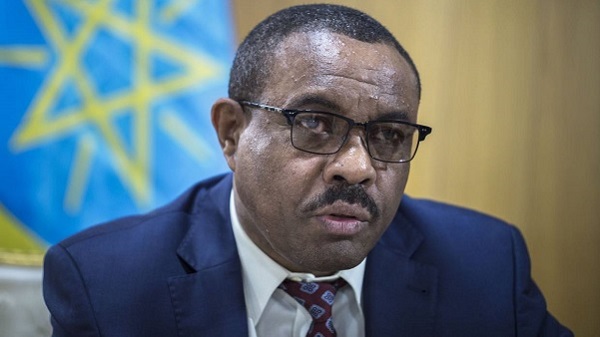
ADDIS ABABA (Africanews)–Ethiopia says it is concerned about the wider security implications arising from the ongoing Gulf crisis on the Horn of Africa region.
Prime Minister Hailemariam Desalegn, in a parliamentary address shown live on the state broadcaster, EBC TV, said Addis Ababa hoped for a peaceful resolution to the crisis whiles admitting that the country could be gravely affected in the event of a regional destabilization.
He affirmed that the country backed Kuwait’s negotiation efforts in the impasse. Ethiopia has previously said it will not take sides on the issue. A similar position was taken by neighboring Somalia.
The Horn region is a peninsula of northeastern Africa (the easternmost part of Africa) comprising Somalia and Djibouti and Eritrea and parts of Ethiopia.
Already Djibouti and Eritrea have reignited a decade-old border tension after the withdrawal of Qatari troops from a disputed area. The withdrawal is believed to be connected to Djibouti having backed Saudi and its allies in the crisis.
Asmara however maintains that like Addis Ababa and Mogadishu, their ties with Doha remained intact, a position that clarified an earlier report that Eritrea had backed the Gulf Cooperation Council (GCC) – the Saudi-led bloc.
Ethiopia is seen as a major player – politically, economically and security-wise in the Horn of Africa region. Aside Eritrea, with who they have a long drawn border dispute, Addis Ababa is on good terms with all its other neighbors.
Ethiopia is actively engaged in the fight against Somalia’s insurgent group, Al-Shabaab. They contribute to the Africa Union mission (AMISOM) and also deploy troops independently to combat the insurgents.
The Gulf crisis – A brief
The diplomatic row started when Egypt, Bahrain, Saudi Arabia, the United Arab Emirates and others in the Gulf Cooperation Council (GCC) broke ties with Qatar on June 5.
The GCC members accused Qatar of supporting terrorist groups in the region, a claim that Doha strongly denies.
Read the complete story at Africanews
